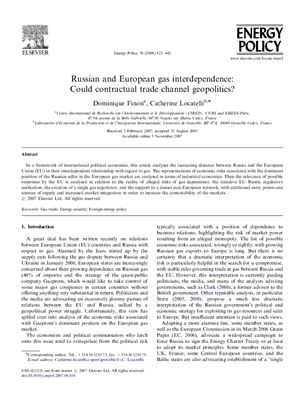На английском языке. Статья опубликована в ж. Energy Policy, 2008,
V. 36, P.423-442.
In a framework of inteational political economics, this article analyses the increasing distance between Russia and the European Union (EU) in their interdependent relationship with regard to gas. The representations of economic risks associated with the dominant position of the Russian seller in the European gas market are analyzed in terms of industrial economics. Then the relevance of possible responses by the EU is analyzed in relation to the reality of alleged risks of gas dependence: the tentative EU–Russia regulatory unification, the creation of a single gas negotiator, and the support to a denser pan-European network, with additional entry points and sources of supply and increased market integration in order to increase the contestability of the markets.
In a framework of inteational political economics, this article analyses the increasing distance between Russia and the European Union (EU) in their interdependent relationship with regard to gas. The representations of economic risks associated with the dominant position of the Russian seller in the European gas market are analyzed in terms of industrial economics. Then the relevance of possible responses by the EU is analyzed in relation to the reality of alleged risks of gas dependence: the tentative EU–Russia regulatory unification, the creation of a single gas negotiator, and the support to a denser pan-European network, with additional entry points and sources of supply and increased market integration in order to increase the contestability of the markets.

